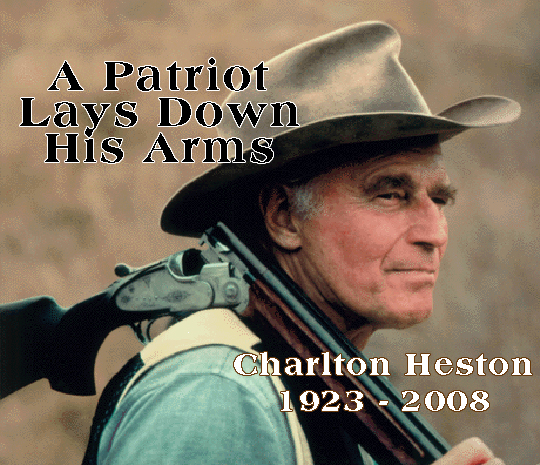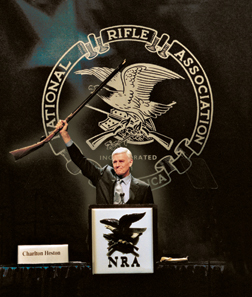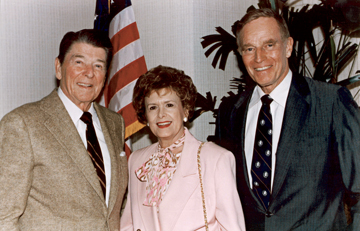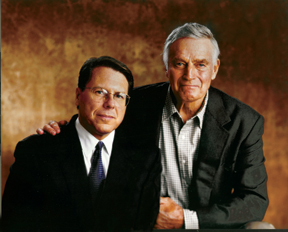
The man who brought the heavens down to Earth through the power of his God-given talent is gone away now—gone to join those whom he portrayed with such persuasion. Charlton Heston, actor, advocate for individual rights and voice of reason in a time of turbulent political manipulation, relinquished the power of his rich baritone to the angels and, following a long battle with Alzheimer’s Disease, slipped gently into that good night.
Born John Charles Carter in 1923, Heston was a man of the people, yet with the power to persuade kings. As a boy he grew to love the rugged life of the nation’s Midwestern outdoors. In his writings, Heston fondly recalled frosty morning woodstoves, the deep silence of forests seemingly without end, of “a deer on the license” harvested under a bracing autumn sky.
In time, Heston developed a flair for theater arts, a passion that followed him through high school and college. But the realization of that passion wouldn’t come easy. He worked in the steel mills to make ends meet. He survived formative years as a starving artist in New York’s Hell’s Kitchen.
When able-bodied men were needed to battle the Axis threat of global domination during the Second World War, Heston volunteered for the U.S. Army Air Force. He married his college sweetheart and remained a loving husband until the end. He won an Oscar and became the universal voice of the scriptures. He marched for civil rights and stood steadfast in his defense of constitutionally protected individual rights. And always, both as a vigorous activist in his physical prime or as an aging advocate for political common sense in a time of turmoil, Heston remained a man of character, anchored by his fiercely defended, unshakeable beliefs.
Maybe it was that instantly recognizable voice, maybe his physical bearing or maybe just the undeniable presence of a consummate actor who naturally commanded center stage. Whatever the reasons, Heston seemed destined to star in biblical dramas. He became Cecil B. DeMille’s Moses and America’s original action hero in “Ben-Hur,” the role that won Heston an Academy Award. Few who’ve seen the movie will ever forget the excitement of the chariot race that catapulted the daring young actor to fame—and won him a lasting place in the hearts of an adoring public.
Over a lengthy career, Heston remained in demand for a variety of roles ranging from Marc Anthony in Shakespeare’s “Julius Caesar” to earthy cowboy “Will Penny” to an aging simian in a sequel to the science fiction classic “Planet of the Apes.” His documentaries on the Holy Land are still cherished by millions. Yet even as a young actor in the prime of his career, and with so much professionally on the line, Heston was always his own man, ready to do moral battle.

This willingness to draw such a firm barrier between what he perceived as right and wrong was as much a part of Heston’s persona as his love of good literature, especially the work of authors who weren’t afraid to throw a punch at society’s sacred cows. Heston sensed the righteousness of certain causes and never hesitated to become their gladiator. He fought against racial prejudice both in Hollywood and in the streets of America long before the cause earned Hollywood’s stamp of respectability. Heston sought equality for stagehands just as dutifully as he marched beside civil rights leader Dr. Martin Luther King, Jr. Considering the turbulence of those times, both on the streets and in the studio, his actions demanded a large leap of faith, as well as ample courage.
Heston once again made headlines and aroused the ire of the entertainment industry when, years later, the rap music movement flooded the American scene. Heston found himself appalled by the violence and degradation erupting throughout the lyrics. One of the most shocking was the album “CopKiller” by the rapper called Ice T. TimeWarner, a multimedia conglomerate Heston held stock in, distributed the record.
Hollywood’s Moses didn’t hesitate. He drove straight to a TimeWarner board meeting, demanded to be heard from the floor and began reading the lyrics aloud in a voice that caused every head in that room to swivel. He read lines that urged assaults on police officers, words that advocated the rape of young girls. And when he finished, those who only moments before had regarded Ice T as simply more lucrative business as usual, hung their heads in shame.
It wasn’t long before Time dropped Ice T from their recording label, and Heston received death threats for what he’d done. As time passed, he laughingly recalled that maybe that board meeting wasn’t in his best business interests, but he remained proud of the outcome. Not many contracts or interviews with TimeWarner would follow. Even so, the first salvo in the continuing struggle to clean up rap and hip hop lyrics belongs to a giant of a man who loved good poetry—and condemned lyrics brimming with violence and hatred.
During the 1990s, Heston viewed the world from his position as veteran actor and activist who’d enjoyed a long and lucrative career spiced by an unquenchable desire to speak out in behalf of those downtrodden. He could have slipped into his twilight years in comfort, enjoying the limelight now and then, living the good life, basking in the glow of celebrity.
But something happened that would resurrect the fire in Charlton Heston’s fighting heart. Over the years Heston, a Kennedy Democrat, watched as his party drifted to the left of the ideals that originally summoned him to serve. When grassroots activism began to wilt in favor of soaring elitism, the actor who loved to play roles depicting the common man began to drift to the right, and with that drift adopted a new party.
The newly-born Republican found his anchor in the tenet of conservative values when the NRA’s Wayne LaPierre urged him to consider speaking out in behalf of the nation’s Second Amendment right to keep and bear firearms. Heston recalled a trip to China, one in which young dissidents, who stood unarmed in front of tanks, told him how wonderful it must be to live in a country where all the people, and not just a powerful few, are blessed with the right to arm themselves against tyranny.
This was a time when pressure from the Clinton administration, along with allies in the media, were working overtime to not only gut the Second Amendment, but also demonize NRA supporters who defended it. Attacks on both firearm ownership and the NRA were vicious, and rarely factual. Sadly, though, they were accomplishing the desired effect. Congress, with its perennial finger testing the political winds, perceived that the feared NRA could be crumbling and that gun bans might equal future votes. The situation was dire, and pro-gun forces realized that a voice of uncommon stature was needed, a voice that could be captivating as well as reasonable. A call went out, and Charlton Heston stepped forward to fulfill what would be his last, and undoubtedly his finest, role.
 Few at the time realized the impact he would have on that turbulent stage. Within weeks the world saw the man they knew as Hollywood’s Moses standing on the most violent corners of America’s most dangerous streets, his booming words reminding listeners that rampant crime, not our constitutional freedoms, was the cause of so much social deterioration and grief.
Few at the time realized the impact he would have on that turbulent stage. Within weeks the world saw the man they knew as Hollywood’s Moses standing on the most violent corners of America’s most dangerous streets, his booming words reminding listeners that rampant crime, not our constitutional freedoms, was the cause of so much social deterioration and grief.
At the same time, Heston rallied the NRA troops, urging each to fight the good fight once more. His appearances at NRA Annual Meetings were like old-fashioned evangelical crusades, his speeches reminiscent of a general addressing his troops. Heston’s was the personification of a way of life that gave us America’s greatest generation. He could rattle the rafters when he spoke, and each syllable seemed to be gilded with implicit honesty.
Suddenly, the NRA had its own Ronald Reagan, and when he told America’s mainstream that they were being lied to about gun ownership and the Second Amendment, the message stuck . . . and inspired action.
Heston became an NRA board member, then president, then president again, always on the front line against media and political interests eager to defame and humiliate him. His vow to restore honor to the NRA name resulted in press conferences brimming with reporters, television interviews on Meet The Press and invitations to address the nation’s most respected universities.
Although the anti-gun coalition tried to tear the man down with every trick up its sleeve, Heston’s intrinsic class, good humor and untarnished honesty won new friends, admirers and recruits. NRA ranks swelled under his leadership, new members trickling into place at first, then rushing in like a flash flood filling a western arroyo. Not hundreds, not thousands but millions of Americans listened to the words of Charlton Heston and vowed to defend constitutionally protected rights passed down over the ages.
When Heston addressed students at Harvard University, many most likely thought he’d be booed out of the auditorium. But when he drew parallels in his speech between gun control and the growing, undemocratic influence of political correctness, those young men and women not only listened, but more than a few began to squirm in their seats. He told America’s next generation of leaders that, in contrast to their fathers and grandfathers, they had become cowards. Cowards to honor style over substance. Cowards in their failure to question authority, especially bureaucratic hypocrites working overtime to reduce the role of the individual in favor of the sentiments of a fashionable few.
Heston won hearts and minds that evening, just as he inspired shock and awe when he went before the National Press Club and told members of the media that the Right to Keep and Bear Arms, the second entry to the Bill of Rights, was in fact the predecessor in importance to the First Amendment right to free speech they cherished so dearly.
The NRA president pointed out that if an individual could not take up arms to protect life, family, property, community, religious beliefs or a duly elected form of government, then how could newspapers, magazines, radio and television stations expect to maintain the ability to report without restraint? He said, while they shuddered, that the Second Amendment was essentially America’s first freedom: the freedom that protected all others, the one that made government for the people and by the people workable and retainable. Such words may at first have seemed like heresy in that particular room. But in time, the editorial frenzy to brand the Right to Keep and Bear Arms as a constitutional heirloom began to wane.
 Few give him credit, but politicians know in their hearts that the revived NRA under Heston was responsible in part for the historic shift in Congress that resulted in a Conservative takeover of both houses and, ultimately, the presidency. Heston worked tirelessly for pro-gun candidates and, when votes were counted, those who stubbornly stuck to their anti-gun campaigns went down to defeat. Even former President Bill Clinton, a vocal anti-gun zealot in his time, said, following the elections, that the NRA had played a major role in shifting the balance of political power.
Few give him credit, but politicians know in their hearts that the revived NRA under Heston was responsible in part for the historic shift in Congress that resulted in a Conservative takeover of both houses and, ultimately, the presidency. Heston worked tirelessly for pro-gun candidates and, when votes were counted, those who stubbornly stuck to their anti-gun campaigns went down to defeat. Even former President Bill Clinton, a vocal anti-gun zealot in his time, said, following the elections, that the NRA had played a major role in shifting the balance of political power.
During two pivotal elections, Charlton Heston fought relentlessly for America’s freedoms under a schedule that would have felled lesser men. He caught early flights to stump for pro-gun candidates in towns and cities across the United States, suffered the obligatory rubber chicken dinners, then stumbled home exhausted after days or weeks on the road. He took considerable heat from reporters on TV and radio shows fixated on defaming his beliefs. And he did it through both a cancer scare and hip replacement surgery, all at a time when most men his age would relegate their days to soft foods and shuffleboard.
In the end it was Alzheimer’s, and not a lack of desire, that caused Heston to step down from his NRA post and a crusade that literally changed the way America thinks about the Second Amendment. Heston was a warrior until the end and, when beset with a disease that would limit him by degrees, he faced the unknown with strength, grace and good humor.
Now he’s gone from us, gone to be among those he most admired and helped immortalize on stage and screen: Moses, Michelangelo, poets, prophets and kings. Heston was a man for all seasons here on earth, and without a doubt he’s earning good reviews in heaven.
So goodbye, amigo, the bugler’s blowing “Boots and Saddles.” It truly was an unforgettable ride.













 More Like This From Around The NRA
More Like This From Around The NRA







